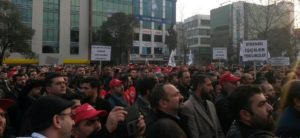 Dear Friends,
Dear Friends,
Dear Comrades,
First of all, let us thank you at the beginning and once again, for your show of solidarity with the metal workers of Turkey.
The bargaining process which covered more than a hundred thousand workers was a candidate to become an important turning point for the current political situation in the country. The despotic regime of Erdoğan and his government had openly sided with bosses in the previous years’ collective bargaining and the same would happen in this one also. It was almost certain that Erdoğan would ban the strike. This objectively meant that the workers’ struggle with plain economic demands was moving towards a head on confrontation with the regime. This would obviously bring about a situation where working class would act like the driving force of the whole countries’ struggle for freedom against the despotism or even might undertake the lead of it. This was explicit in the enthusiasm, massiveness and resoluteness of the workers during the union meetings, demonstrations and alert actions like short hourly work stoppages etc. This would potentially create a situation where the struggle for bread and freedom (two main branches of struggle in Turkey flowing from separate roads) would be united strong and change the whole scene.
Under these conditions, international solidarity was extremely precious…
The international statement of solidarity was published on RedMed and Gerçek in English and that the call for the solidarity has been translated, apart from Turkish, into 6 languages (English, Spanish, French, Italian, Persian and Bulgarian) and was widely distributed internationally. As a result of this, more than 200 signatures from across 22 countries (Argentina, Greece, Russian Federation, France, Cuba, Cyprus, Azerbaijan, Iran, India, Lebanon, Canada, USA, Finland, Hungary, Bulgaria, Romania, Brazil, Peru, Italy, Spain, Austria and Sweden) were collected just within days. In addition, there were numerous messages of solidarity directed to the workers which have all been conveyed to their addressees together with the international statement in an earlier stage.
Just days before the workers were about to launch their strike, there came a blow to their struggle from the trade union bureaucracies. First, the largest trade union (Turkish Metal Workers Union) signed an agreement with the bosses days before the strike was due to start, also taking the union ranking third in the industry with it, the one that is close to the government party. Then the left-wing United Metal Workers Union was called to a meeting with the bosses at midnight which they conformed to. It seems that, in this meeting the administration of the United Metal Workers Union, too, accepted the same terms with the others. But this was rejected next day where majority of the factories and workers denounced the conditions of the deal. The decision was eventually taken after an hours long discussion of union representatives of all the factories and by the workers chanting the slogans echoing the catchwords of our international call of solidarity: strike, occupy, resist!
But only several days after this meeting, deliberately, United Metal signed the very same deal -which was rejected earlier by the workers- under great pressure from the government and the bosses. Despite their disappointment, the majority of the workers, understood that they were on favorable ground feeling the strength of their long-awaited unity enough to reclaim the unofficially proscribed right to strike and whose fervent will of continuing the fight was still alive but were betrayed by their leaders, were not organized enough to overcome the limiting conditions and de facto carry out the strike and launch occupations. Yet the combative spirit that came alive made possible gains. The sheer strength of the workers’ movement which forced the bosses to triple their initial proposal on the wage increases and more importantly to cast aside the longer contract terms that they tried to impose which was pretty disadvantageous for the workers.
The entire process, including the international solidarity shown, undoubtedly added to the experience of the workers, especially the most class-conscious ones. DIP, the Revolutionary Workers’ Party, was very active during the whole struggle both in the factories or within the trade unions and also in the bosom of the sections of society that leaned to develop concrete acts of solidarity.
Long live international proletarian solidarity!
Strike, occupy, resist!


Leave a Reply